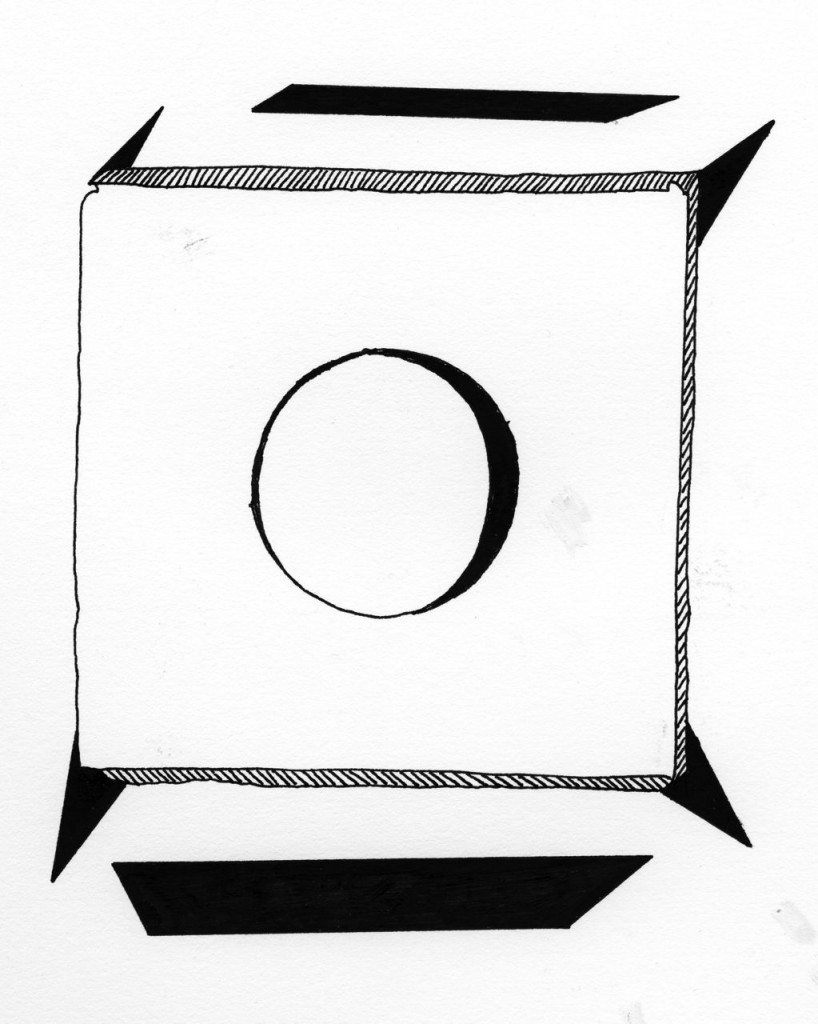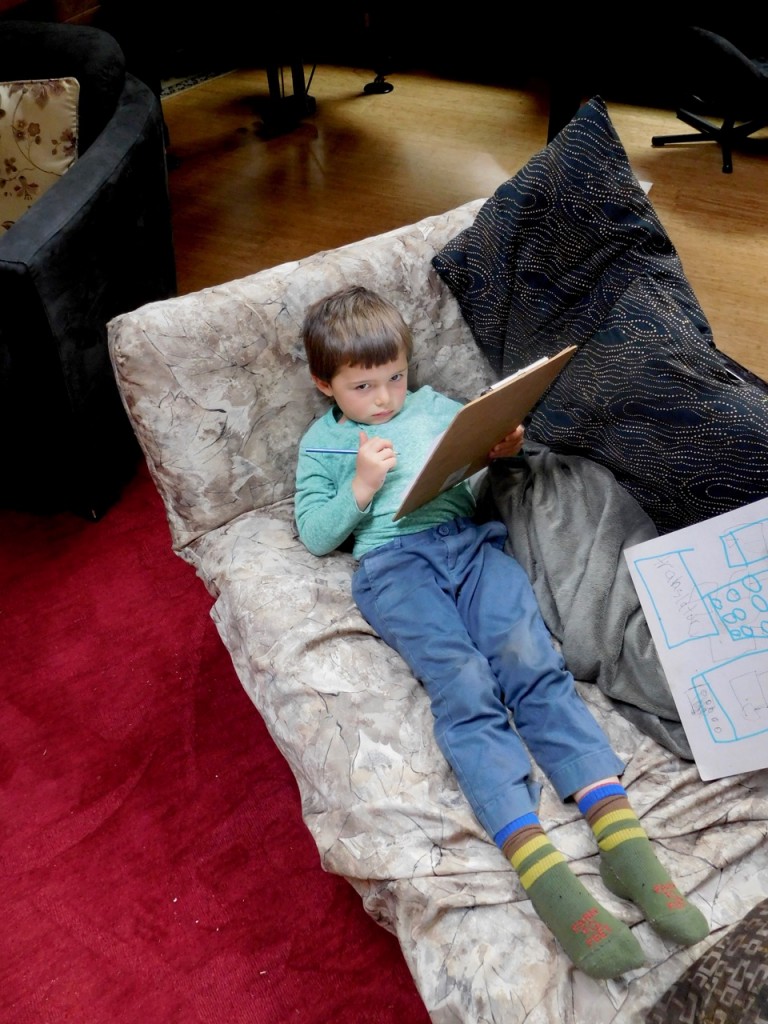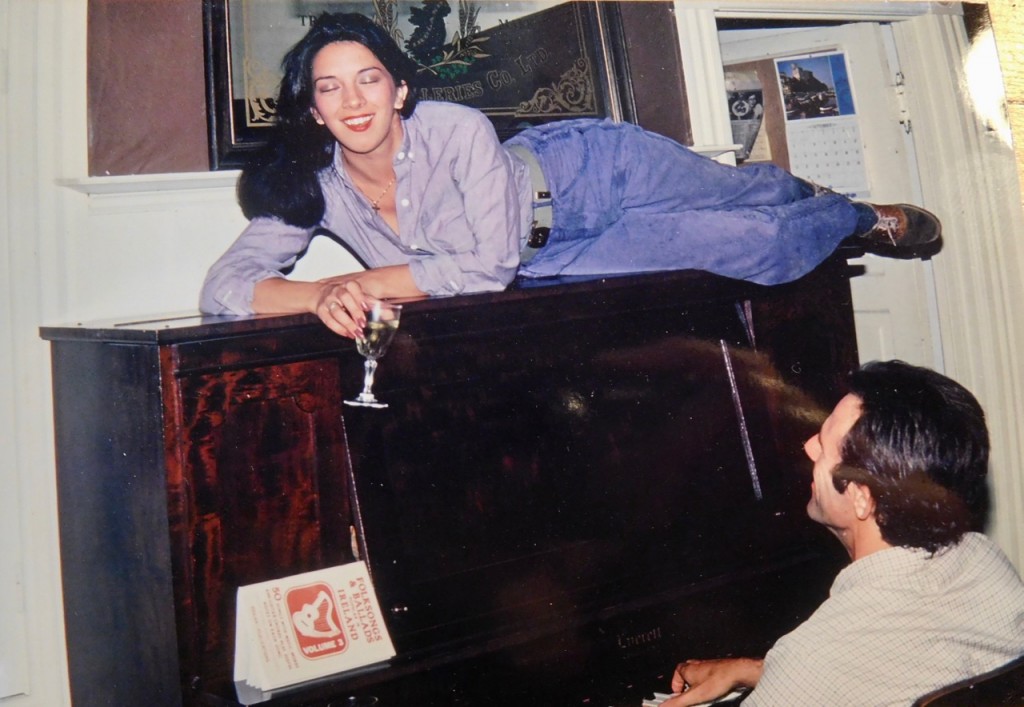This story is a continuation of Almost Fifteen, which is the fifth story in the Nathan and Del series. Almost Fifteen and Fifteen may be enjoyed together without resort to the first four parts of the saga, although reading the previous episodes will enhance your enjoyment of these later chapters of the saga.

On the morning of the opening of her show of drawings at the Fletcher Gallery, Delilah wakes to her pillow and sheets soaked with sweat. She tries to get out of bed, but can barely lift her head or arms.
She calls, “Celia?” and when no one responds to her call, she tries again to get up, and again she can barely move.
“What’s wrong with me?” she murmurs, and feeling frightened she makes a greater effort and manages to sit up and swing her legs off the bed.
“Nate? Celia?” she calls, struggling to her feet only to wobble and fall back onto her soggy sheets.
Now the bedroom door opens and here is Celia who was working in the garden with Nathan and thought she heard Delilah call. A nurse for forty-five years, Celia quickly assesses the situation, feels Delilah’s forehead, and helps her stand up.
“Come lie down in the living room and I’ll change your sheets,” says Celia, helping Delilah walk down the hall. “You have a pretty high fever.”
“I’m so weak,” says Delilah, clinging to Celia. “I went to bed feeling fine.”
Celia has Delilah drink two big glasses of water before helping her lie down on the living room sofa and covering her with a blanket, whereupon Grace the calico cat settles on Delilah’s chest and begins to purr thunderously.
Done changing the sheets, Celia returns to the living room and places her hand on Delilah’s forehead.
“Better,” says Celia, tenderly. “You hungry?”
“No,” says Delilah, mournfully. “I’d just throw up. And now I won’t be able to go to the opening. I’m way too sick.”
“We’ll see,” says Celia, moving into the kitchen and putting a kettle on. “I’ll make you some bouillon.”
“We already see,” says Delilah, plaintively. “I’m too sick to go. I can barely move.”
Nathan comes in from the back deck followed by Tennyson.
The little dog gives Delilah a quizzical look, sees the cat has taken possession of her, and trots back outside.
Nathan looks down at Delilah. “What’s going on, D?”
“I’m ill,” she says peevishly. “I drenched my sheets and pillow with sweat. I have a raging fever and I’m dizzy and weak and nauseated, and now I can’t go to the opening after all the trouble Joseph and Constance went to having their piano moved to the gallery. I feel terrible.”
Nathan nods. “I thought this might happen.”
“What do you mean?” says Delilah, glaring at him. “You thought I’d get sick? Why would you think that? You don’t think I’m pretending, do you? I’m really ill, Nate. Feel my forehead.”
He places his big cool hand on her forehead and looks into her eyes. “I don’t think you’re pretending. But I’ll bet you five bucks there’s nothing wrong with you except a little thing called fear.”
“Don’t be ridiculous,” she says, her eyes filling with tears. “I’m not afraid. I’m ill.”
“Sun’s coming out,” he says, going to the door. “Let’s have our tea on the deck.”
“I can’t move,” she says angrily. “Celia had to practically carry me in here from my bedroom and I almost passed out on the way.”
“Methinks you exaggerate,” he says, looking at Celia bustling around in the kitchen. “She gonna die, doctor?”
“Not today,” says Celia, shaking her head. “But you’re not being very nice to her.”
“Yeah, Nate,” says Delilah, pouting. “I feel so guilty about letting Constance and Joseph and William and Guillermo down, and all the people we invited.”
“Come out in the sun,” he says, lifting the cat off her. “I’ll cure you.”
“How?” she says, believing him for a moment.
“I’ll show you,” he says, giving her a hand up.
*
Delilah lies on a chaise longue with a big pillow behind her head, sipping bouillon while Nathan and Celia sit close by, Nathan having nettle tea and Celia coffee.
“Long ago when I was a poet of some renown,” says Nathan, gazing at the verdant garden, “I’d routinely get sick a few days before I was going to perform. I’d start coughing and running a fever, soaking my sheets with sweat, and it never occurred to me I was afraid because I loved reading for people, the more the merrier.”
“But I’m not afraid of performing,” says Delilah, frowning. “I wanted to go to my opening.”
“I wasn’t afraid of performing either,” he says, shaking his head. “That’s what I’m trying to tell you. Performing wasn’t what I feared. Reading for an audience was my bliss, as Jung would say.”
“Then what were you afraid of?” she asks, bewildered.
“I was afraid to do what I was not supposed to do, what I was punished for a thousand times when I was a boy and a young man. I was not allowed to be a poet.”
He thinks of his mother and father and how his love of plays and poetry, his desire to be a poet, caused them to constantly abuse him, physically and emotionally, and this abuse planted in his subconscious the belief that to be a poet, and more especially to present himself to the world as a poet, was verboten, a mortal sin.
“But I’m allowed to make art and compose music,” says Delilah, defiantly. “My mother loves my drawings and my piano playing. And so do you and Celia, and so do Constance and Joseph. I’ve always been allowed to do those things.”
“Right,” he says, nodding. “So that’s not what you’re afraid of.”
“Why do I have to be afraid of something?” she asks, petulantly. “Why can’t you just let me be sick, which I obviously am?”
“I can and I will,” he says, smiling at her. “Though I’ll bet you anything the cause isn’t physical.”
“Then what’s the cause?” she says, feeling like screaming at him. “If you’re so sure you know.”
“You can scream at me if you want,” he says, knowing exactly how she feels. “Only I’m not the person you really want to scream at.”
“Who do I really want to scream at?”
“Who do you think?” he asks, expectantly.
“Not my mother!” she shouts, bowing her head and sobbing. “This is not her fault. She did everything for me. Why are you torturing me like this?”
“That’s enough, marido,” says Celia, touching Nathan’s hand.
“Not quite,” he says, getting out of his chair and kneeling beside Delilah. “Look at me, kiddo.”
She squints at him. “I hate you.”
“No you don’t,” he says, shaking his head. “You love me. And I love you. And because I love you I’m going to tell you something you already know with every cell in your body because you were taught it from the moment you were born until you moved in with us eighteen months ago.”
“What?” she says, crying. “And I don’t hate you. I’m sorry I said that, but you made me so mad.”
“I know you don’t hate me, D,” he says softly. “But you hate something, and that something is what you know with every cell in your body, every synapse in your brain. That something is why you soaked your bed with sweat, and why you’re weak and exhausted.” He waits a moment. “You want to say it?”
“No,” she says, shaking her head. “I don’t know what it is.”
“You want to guess?” he asks, nodding to encourage her.
She gazes into his kindly eyes and whispers, “I have to stay inside. It’s not safe to go out.”
“That’s right,” he says quietly. “You’re supposed to stay hidden from the world. You can do anything you want, anything money can buy, but you must stay inside so no one can see you. You must stay hidden. That’s the rule that was killing you. And your mother knew it. That’s why she brought you here and set you free. But she only brought you here a little while ago, right?”
“Yes,” says Delilah, sobbing. “Just… just… just a little while ago.”
“And the part of you that takes over when you go to sleep,” he says, crying with her, “is the old automatic program saying ten thousand times a night, ‘You must stay inside. You must stay hidden. It’s not safe to go out. If you go out there you’ll die. If you go to the opening you’ll die.’ But you fought that old programming, D. You fought it with all your might, and that’s why you soaked your sheets with your valiant sweat. You were fighting the old rules that you and all your nannies lived by since the day you were born.”
She looks up at him, suddenly aware. “But I didn’t die. And I don’t have to hide anymore. And…” She hesitates. “I can go to my opening.”
“Yes, you can,” he says, getting to his feet. “Now lets have some breakfast and get you fueled up so you can keep fighting.”
*
After breakfast, Delilah lies down on the living room sofa and sleeps without stirring for five hours.
She wakes to the smell of fish frying—Celia making fish tacos for supper.
*

At the opening, the three rooms of the Fletcher Gallery are jammed with people, and there are many more people outside listening through the open doors and windows.
Delilah plays her nocturne with a depth of feeling she has never known before, and when she finishes, the roar that goes up is the universe saying, “Now you know what makes art divine.”
*
Later that night, Joseph and Constance join Nathan and Celia and Delilah at Nathan and Celia’s house to celebrate with champagne and Celia’s incomparable cheesecake.
Joseph is high as a kite, having sold three of his paintings; his Mouth of the Mercy to the Mercy Hotel to adorn the hotel lobby, his Delilah On a Ladder in the Winter Orchard to an anonymous collector, and Nathan and Celia in Their Garden purchased online by Joseph’s mother in Devon, an avid gardener in her late eighties.
“To your triumphant performance,” says Constance, holding aloft her glass of champagne, she and Joseph and Celia drinking the real thing, Nathan and Delilah having sparkling apple cider. “And you sold all your drawings, Delilah. Incredible.”
“And both paintings,” says Celia, clinking her glass with Delilah’s.
“William is ecstatic,” says Delilah, barely able to keep her eyes open.
“I’m amazed,” says Joseph, gazing around the table at his wife and friends illuminated by candlelight. “Astounded. The last thing I expected when we came here was that I would have a show in a local gallery, let alone sell three paintings on opening night, and at my usual prices, which are not exorbitant, but certainly aren’t low.” He guffaws. “We didn’t even know there were galleries here until we got here.”
“We imagined a spartan existence of work and little socializing,” says Constance, her eyes sparkling. “We would make our simple food and love our dogs, and at the end of their lives we would go back to England and live in quiet retirement with two lapdogs of a breed yet to be determined. And now we eat with you Michelin-star chefs three times a week and have friends galore, and I must force myself to sit down and write or I would never make my deadlines.” She looks at each of them. “We just love it here, and mostly because of you three.”
“And what I realized tonight,” says Joseph, moved by the sight of Delilah falling asleep in her chair, “while talking to your charming brother, Celia, was that art should never be considered the exclusive purview of the highly educated or the culturally sophisticated, but the birthright of every human being.”
“You got that from talking to Juan?” asks Celia, glancing at Nathan. “Tell us more.”
“We were standing at my painting Mouth of the Mercy,” says Joseph, remembering the moment, “and Juan said, ‘That was in May. I remember when the river was cutting through the beach like that. You got those breakers on the sand bar just right. A good day for surfing, but you left out the surfers.’ And then we moved to my painting of the deep pool off the rocks south of town where you took me to paint in July, and Juan said, ‘I once caught a rock cod from that pool almost three feet long. Biggest rock cod I ever caught. You got those greens and blues just right, how the color changes with the depth.’ And then he smiled at me and said, ‘You paint things how they really are, Joseph, only not exactly. You make them… what’s the word? Romantic maybe?’ And I was so touched I gave him a hug and thanked him, and he laughed and said, ‘No, man. I’m thanking you for making such beautiful art.’”
“Our darling girl is asleep,” says Constance, gazing fondly at Delilah leaning against Nathan.
“No,” says Delilah, opening her eyes. “I’m here.”
“Come on,” says Celia, getting up from the table and holding out her hand to Delilah. “Time for bed.”
“Oh but I don’t want to miss anything,” she says, yawning.
“We’ll tell you all about it tomorrow,” says Celia, pulling Delilah to her feet and guiding her down the hallway to her bedroom.
“I’ve known a handful of geniuses in my life,” says Joseph, speaking quietly. “All crazy as loons, except for our Delilah.”
“What I found out after I’d lived here for thirty years,” says Nathan, remembering the day he arrived in Mercy, brokenhearted over his ruined career, his few possessions in the back of an old pickup, “is that everyone is a genius. We just have to open our hearts and minds to the truth of that.”
“Do you really think so?” says Joseph, wrinkling his nose. “That everyone is a genius?”
“I know so,” says Nathan, nodding. “And we do them a great disservice when we don’t acknowledge their genius.”
“I think our definitions diverge,” says Constance, who has always felt she is not a genius, but still rather good at writing mysteries. “If by genius you mean uniqueness, I agree. But I think Joseph and I are speaking of super extraordinary talent. Incomparable talent.”
Celia returns from putting Delilah to bed, sits in the chair next to Nathan, drinks the last of her champagne, and nods her thanks as Joseph fills her glass again.
“Your dear husband believes everyone is a genius,” says Joseph, smiling at Celia. “And now we are dickering over the definition.”
“My grandmother,” says Celia, thinking of her grandmother Rosa kneading dough for her tortillas, “never went to school and didn’t know how to read, but she was the best cook I’ve ever known, and I’ve known some very good cooks. Was she a genius? I think so. And tonight at the gallery I was talking to Philip. You’ve probably seen him sitting with his dog Diana in front of the market with the little sign that says Money For Me and My Dog?”
“Of course,” says Joseph, nodding. “The homeless fellow. We’ve given him money several times, after which he always has his dog hold out her paw in thanks, and then he sings a song in a pleasing tenor, usually a Beatles song, though I must admit we don’t often stay to listen after Constance shakes the dog’s paw.”
“Takes wonderful care of his pooch,” says Constance, nodding. “Samoyed Lab mix he told us.”
“Well,” says Celia, holding Nathan’s hand, “would you like to know what Philip said about your painting of Delilah on the ladder in the orchard?”
“Yes, please,” says Joseph, curious to know. “Unless it’s something dreadful.”
“It’s not dreadful,” says Nathan, laughing.
Celia closes her eyes to remember. “He said, ‘She is the untarnished soul reborn amidst the seeming dead, only those branches aren’t dead. They are in the bardo of slumber, soon to be reborn, as everything is reborn and dies and is reborn again.”
“How ever did you remember that?” asks Constance, doubting the scraggly homeless fellow said such a beautiful thing about Joseph’s painting.
“She wrote it down,” says Nathan, giving Celia’s hand a loving squeeze. “Had him say it again and again until she got every word in the right order.”
“You heard him, too?” says Joseph, also doubting.
“I was there,” says Nathan, smiling sublimely. “We were standing in front of your magnificent painting of Delilah in the embrace of those seemingly barren branches, and I knew just what he meant.”
“Me, too,” says Celia, her eyes shining with tears. “And that’s when we decided to buy your painting of Delilah, so we can look at it every day.”
fin










